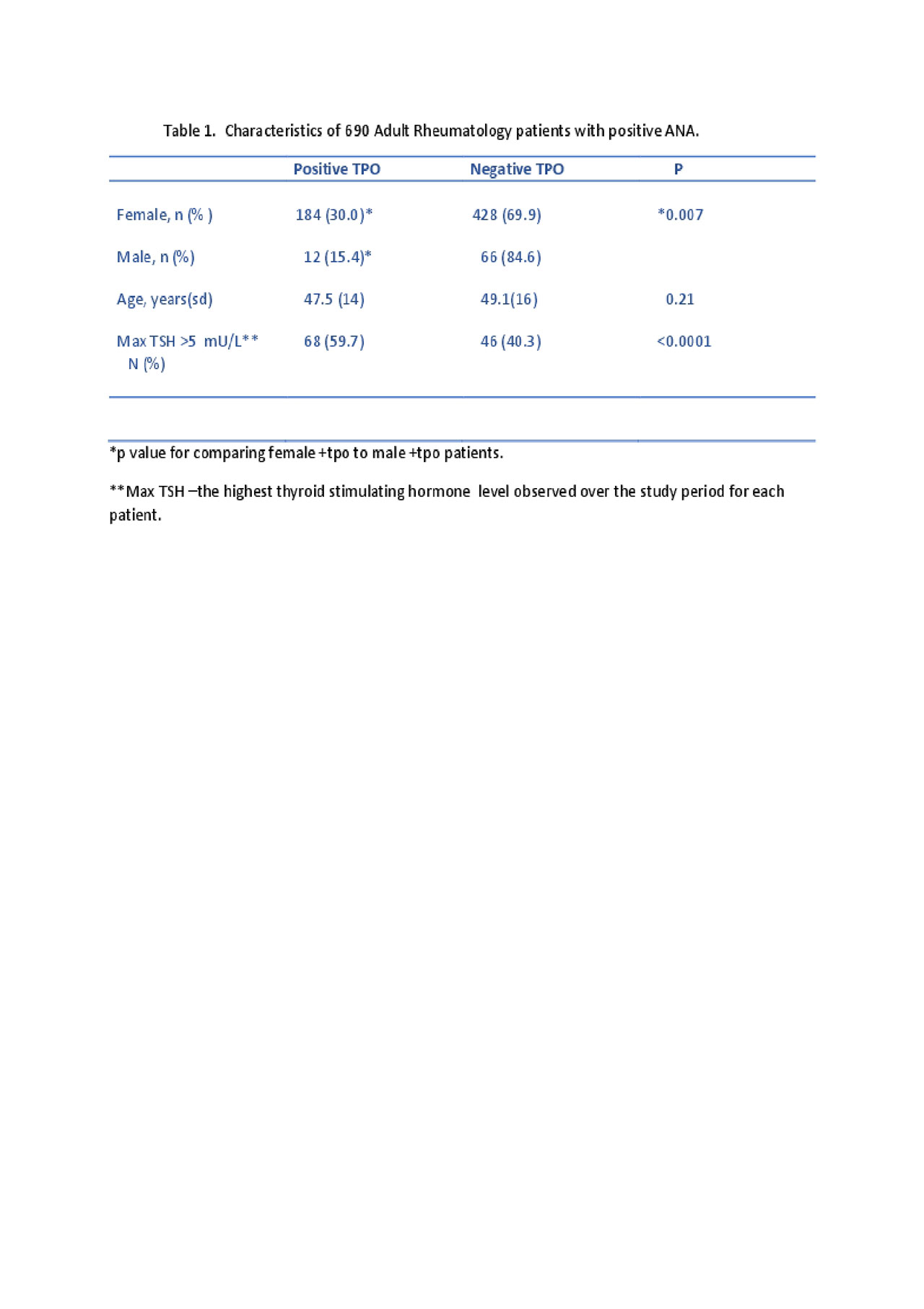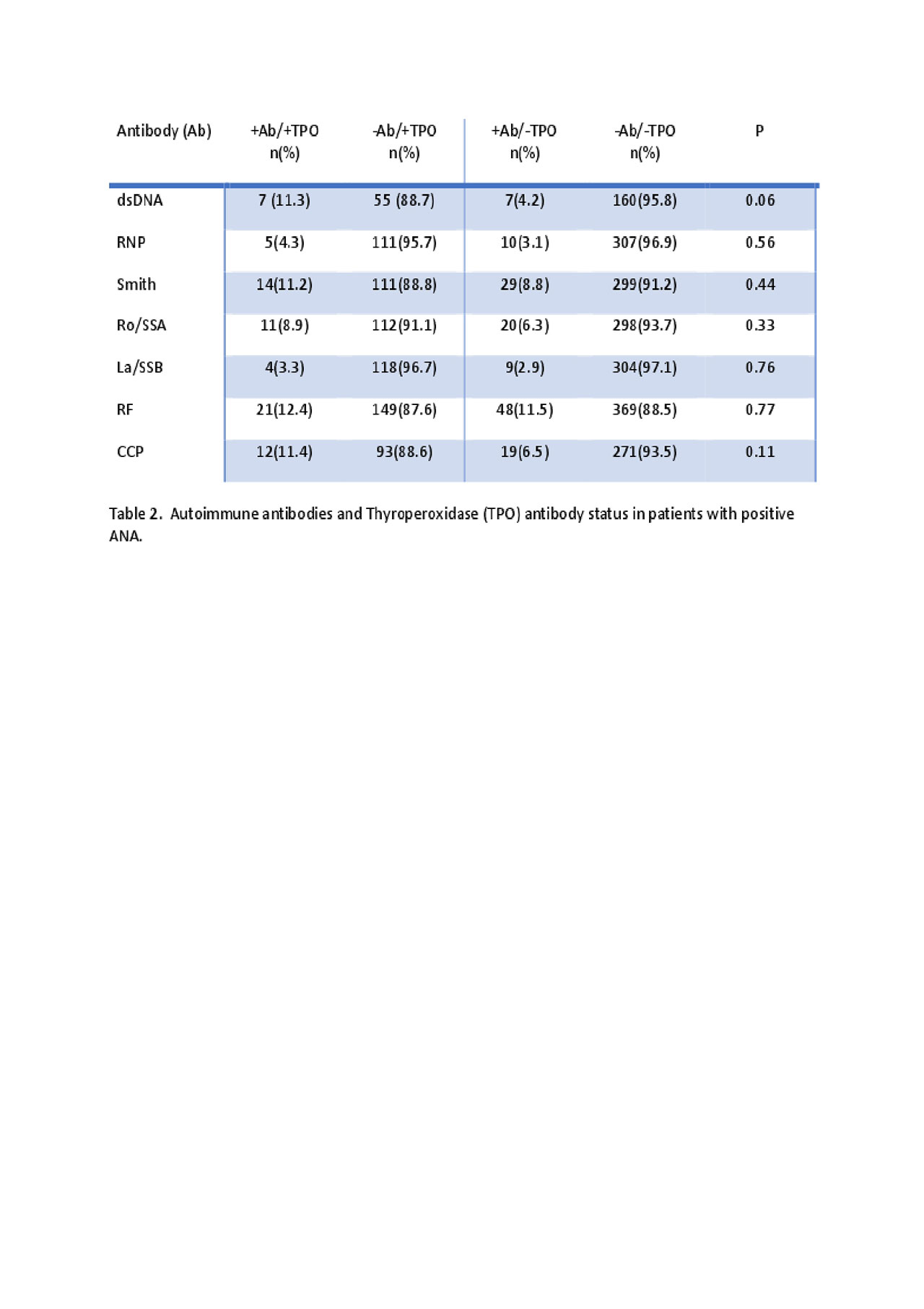Session Information
Date: Tuesday, November 12, 2019
Title: Miscellanous Rheumatic & Inflammatory Disease Poster III: Autoimmune Conditions and Therapies
Session Type: Poster Session (Tuesday)
Session Time: 9:00AM-11:00AM
Background/Purpose: Autoimmune thyroid disease, which is defined by the presence of thyroid antibodies, is the most common organ specific autoimmune disorder, affecting 11% of the general population1. There is a reported higher prevalence of thyroiditis in older women, and patients with systemic lupus (SLE), Sjogren’s, or RA. Antinuclear antibodies (ANA) are present in 45% of patients with thyroid antibodies, but there are no studies looking at the prevalence of thyroiditis in ANA positive (ANA+) patients. Our goal was to report the prevalence of thyroperoxidase antibodies (TPO ab) in ANA+ patients, and define associations with disease specific autoantibodies, gender, age, and thyroid dysfunction.
Methods: Lab data from 1/1/2010 to 8/1/2018 on ANA+ rheumatology patients followed at an academic center was evaluated for the presence of the most recent TPO, dsDNA, Smith, RNP, Ro/SSA, La/SSB, RF, and CCP antibodies, and for the highest or maximum thyroid stimulating hormone (TSH) level reported for each patient over the study period . Antibody positivity, existence of elevated highest TSH, and gender were compared between TPO ab groups by Chi square or Fisher’s exact test. ANA titers within 1 year of TPO ab testing, and age were analyzed relative to TPO ab titers using regression analyses or Kruskal-Wallis. Upper reference values for TPO ab were >35 or 61 IU/mL depending on year of testing and >5 mU/L for TSH.
Results: Of 690 ANA+ adults who had TPO ab testing, 196 (28.4%) had positive TPO ab (+TPO), and consisted of 184 (93.9% ) females at a mean age of 47.5 years, see Table 1. There was no age difference between +TPO and -TPO groups. There was no significant difference in the prevalence of autoantibodies between TPO groups, Table 2. There was no relationship between ANA titer (p=0.265) or age (p=0.136) to TPO titer. There was a significant correlation between +TPO status and history of elevated TSH.
Conclusion: TPO antibodies, which are specific for thyroiditis, were present in 30% of ANA+ female patients, higher than the 16-20% prevalence reported in the general female population for the same age group1. Serologic markers for RA, Sjogrens, and SLE, were not higher in the +TPO group despite reports of increased TPO ab prevalence in these autoimmune conditions; additional workup for these autoimmune markers should not be routine in +TPO ab patients due to the low yield. This study did not compare the presence of TPO ab in patients with or without positive ANA, therefore no conclusion can be drawn as to the effect of ANA positivity on TPO ab positivity, although this study found no correlation between TPO and ANA titers. The strong association between TPO ab and TSH elevation justifies screening ANA+ patients for thyroiditis due to the increased risk of hypothyroidism. Future work will look at the presence of TPO ab and symptoms that may define thyroiditis with subclinical hypothyroidism.
- Hollowell JG, et. al., J Clin Endocrinol Metab 87: 489-499, 2002.
To cite this abstract in AMA style:
Lau C, Legunn S, Nevares A, Osler T. Thyroperoxidase Antibodies in Patients with Positive ANA [abstract]. Arthritis Rheumatol. 2019; 71 (suppl 10). https://acrabstracts.org/abstract/thyroperoxidase-antibodies-in-patients-with-positive-ana/. Accessed .« Back to 2019 ACR/ARP Annual Meeting
ACR Meeting Abstracts - https://acrabstracts.org/abstract/thyroperoxidase-antibodies-in-patients-with-positive-ana/


